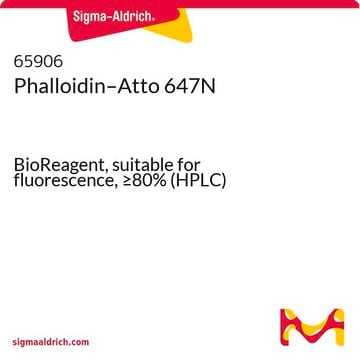49409
Phalloidin-Atto 488
BioReagent, suitable for fluorescence, ≥90% (HPLC)
Synonyme(s) :
Atto 488, Atto 488 Phalloidin
About This Item
Produits recommandés
Gamme de produits
BioReagent
Niveau de qualité
Pureté
≥90% (HPLC)
Forme
solid
Fabricant/nom de marque
ATTO-TEC GmbH
λ
in water
Absorption UV
λ: 499-505 nm Amax
Adéquation
suitable for fluorescence
Température de stockage
−20°C
Description générale
Application
Caractéristiques et avantages
- Strong Absorption.
- High Fluorescence quantum yield.
- High Photostability.
- Minimal Triplet formation.
Informations légales
Mention d'avertissement
Danger
Mentions de danger
Conseils de prudence
Classification des risques
Acute Tox. 1 Dermal - Acute Tox. 2 Inhalation - Acute Tox. 2 Oral
Code de la classe de stockage
6.1A - Combustible acute toxic Cat. 1 and 2 / very toxic hazardous materials
Classe de danger pour l'eau (WGK)
WGK 3
Point d'éclair (°F)
Not applicable
Point d'éclair (°C)
Not applicable
Équipement de protection individuelle
Eyeshields, Faceshields, Gloves, type P3 (EN 143) respirator cartridges
Certificats d'analyse (COA)
Recherchez un Certificats d'analyse (COA) en saisissant le numéro de lot du produit. Les numéros de lot figurent sur l'étiquette du produit après les mots "Lot" ou "Batch".
Déjà en possession de ce produit ?
Retrouvez la documentation relative aux produits que vous avez récemment achetés dans la Bibliothèque de documents.
Les clients ont également consulté
Notre équipe de scientifiques dispose d'une expérience dans tous les secteurs de la recherche, notamment en sciences de la vie, science des matériaux, synthèse chimique, chromatographie, analyse et dans de nombreux autres domaines..
Contacter notre Service technique










